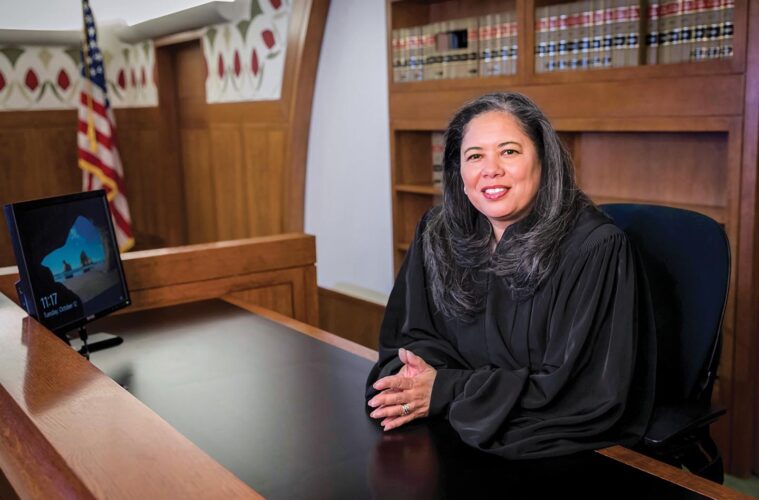When Angel Kelley ’89 was a high school student looking at colleges, Colgate’s off- campus study program in Japan became a deciding factor. Kelley’s mother was Japanese, and Kelley had relatives in the country whom she’d never met. “It was transformative. I developed a greater confidence in myself through embracing my heritage,” says Kelley. Two years later, she studied abroad again in China. “I fell in love with traveling and learning about different cultures.”
Those early experiences sparked a deep-seated desire to understand and appreciate cultural differences, rather than prejudging others. “It gave me an open- mindedness toward people,” Kelley says. That attitude has perfectly suited her to become a judge, serving for more than a decade in Massachusetts state courts. This September, President Joe Biden nominated her for a new position as a judge for the U.S. District Court. Confirmed by the U.S. Senate, she became only the second Asian American and second Black woman (Kelley’s father was Black) ever appointed to the federal bench in Massachusetts. “I always wanted to be a federal court judge and so I was thrilled to have achieved my dream,” she says.
Kelley brings a unique range of experiences to her position. After attending Georgetown Law School, she served as a law guardian for children with the New York Legal Aid Society, where she was called upon to make difficult decisions affecting the lives of children and their families. “I tried to really understand the litigants and the impact it could have on the children before passing judgment,” she says. She went on to become a juvenile defense attorney, before pivoting to serving as a government lawyer with the Port Authority of New York and New Jersey. Though during law school, she had once considered a focus on prosecuting police, she found herself in a position to defend police officers accused of false arrest or excessive force. Kelley brought her usual open-mindedness and empathy to the role. “I found that work to be rewarding as well, because sometimes I could defend officers in cases that were frivolous, and in other cases where wrong was done, I could recommend settling the case to right the wrong.” Kelley also worked on developing a law curriculum for the Port Authority Police Academy.
After moving to Massachusetts to teach at Harvard Law School, Kelley became a prosecutor in the U.S. Attorney’s Office. Her experience on both sides of the courtroom made her ideal for her position as a state court judge. Resisting the isolation that can sometimes come with the position, she continued to connect with communities as chair of the public outreach committee, arranging for opportunities for her colleagues to interact through town halls and listening sessions at criminal detention centers, universities, high schools, middle schools, libraries, community organizations, and senior centers. At the same time, she has kept up her love of international travel, conducting legal trainings in countries including Liberia, Kenya, Tanzania, China, and Turkey.
Now as a U.S. District judge, Kelley looks forward to using the tools available in the federal system, such as drug courts, restorative justice, and reentry programs, which create opportunities to individualize the criminal justice process. “What people want is an equal opportunity to be heard and to be treated fairly,” Kelley says. “Judges don’t have a say in what cases come to the court, but how we handle them, how we dispense justice — that’s our domain. Once they come, I always ask, what can I do to place people who come before us in a better position than when they arrived?”

